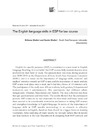Identificador persistente para citar o vincular este elemento:
https://accedacris.ulpgc.es/jspui/handle/10553/9715
| Campo DC | Valor | idioma |
|---|---|---|
| dc.contributor.author | Xhaferi, Brikena | en_US |
| dc.contributor.author | Xhaferi, Gezim | en_US |
| dc.date.accessioned | 2013-02-28T06:00:20Z | - |
| dc.date.accessioned | 2018-03-15T14:30:11Z | - |
| dc.date.available | 2013-02-28T06:00:20Z | - |
| dc.date.available | 2018-03-15T14:30:11Z | - |
| dc.date.issued | 2011 | en_US |
| dc.identifier.issn | 1133-1127 | en_US |
| dc.identifier.uri | https://accedacris.ulpgc.es/handle/10553/9715 | - |
| dc.description.abstract | English for specific purposes (ESP) is considered as a new trend in English Language Teaching. It is our belief that ESP courses help students become more proficient in their field of study. The present study was done during academic year 2009/2010 at the Department of Law, South East European University (SEEU) and it is based on the importance of language skills, students’ and teachers’ attitudes towards an ESP course and the importance of needs analysis. ESP course took place once a week and it had two classes of 45 minutes each. The participants of the study were 40 Law students, both genders, 8 departmental instructors and 4 administrators. The participants had different ethnic backgrounds, Albanian, Macedonian and Turkish. The data collection was done through questionnaires and interviews. The results showed that the participants perceive ESP courses to be very important for their study and future career and there seemed to be considerable motivation and interest in taking ESP courses and strengthen knowledge in English language. In terms of the importance of language skills in ESP, specific terminology is an obstacle to effective communication in English, therefore there should be a bigger focus on learning vocabulary. After analyzing all study results, we strongly believe that its results can help teachers at the Law Department in designing their ESP curricula and can be used for learners and teachers by serving as a reference to facilitate learning English for Law. | en_US |
| dc.format | application/pdf | es |
| dc.language | spa | en_US |
| dc.relation.ispartof | LFE. Revista de Lenguas para Fines Específicos | en_US |
| dc.source | LFE. Revista de lenguas para fines específicos. Las Palmas de Gran Canaria: Universidad de Las Palmas de Gran Canaria, 1993 [ISSN 1133-1127], n. 17, 2011, p. 431-448 | en_US |
| dc.subject | 570107 Lengua y literatura | en_US |
| dc.subject | 550510 Filología | en_US |
| dc.subject.other | ESP course | en_US |
| dc.subject.other | Law Department | en_US |
| dc.subject.other | Language skills | en_US |
| dc.subject.other | Needs analysis | en_US |
| dc.title | The English language skills in ESP for law course | en_US |
| dc.type | info:eu-repo/semantics/article | en_US |
| dc.type | Article | en_US |
| dc.compliance.driver | 1 | es |
| dc.identifier.absysnet | 233536 | - |
| dc.investigacion | Artes y Humanidades | en_US |
| dc.rights.accessrights | info:eu-repo/semantics/openAccess | es |
| dc.type2 | Artículo | en_US |
| dc.utils.revision | Sí | en_US |
| dc.identifier.ulpgc | Sí | en_US |
| dc.description.esci | ESCI | |
| dc.description.erihplus | ERIH PLUS | |
| item.fulltext | Con texto completo | - |
| item.grantfulltext | open | - |
| Colección: | LFE, Rev. leng. fines específ. n.17, 2011 Artículos | |
Visitas
271
actualizado el 09-ene-2026
Descargas
629
actualizado el 09-ene-2026
Google ScholarTM
Verifica
Comparte
Exporta metadatos
Los elementos en ULPGC accedaCRIS están protegidos por derechos de autor con todos los derechos reservados, a menos que se indique lo contrario.
